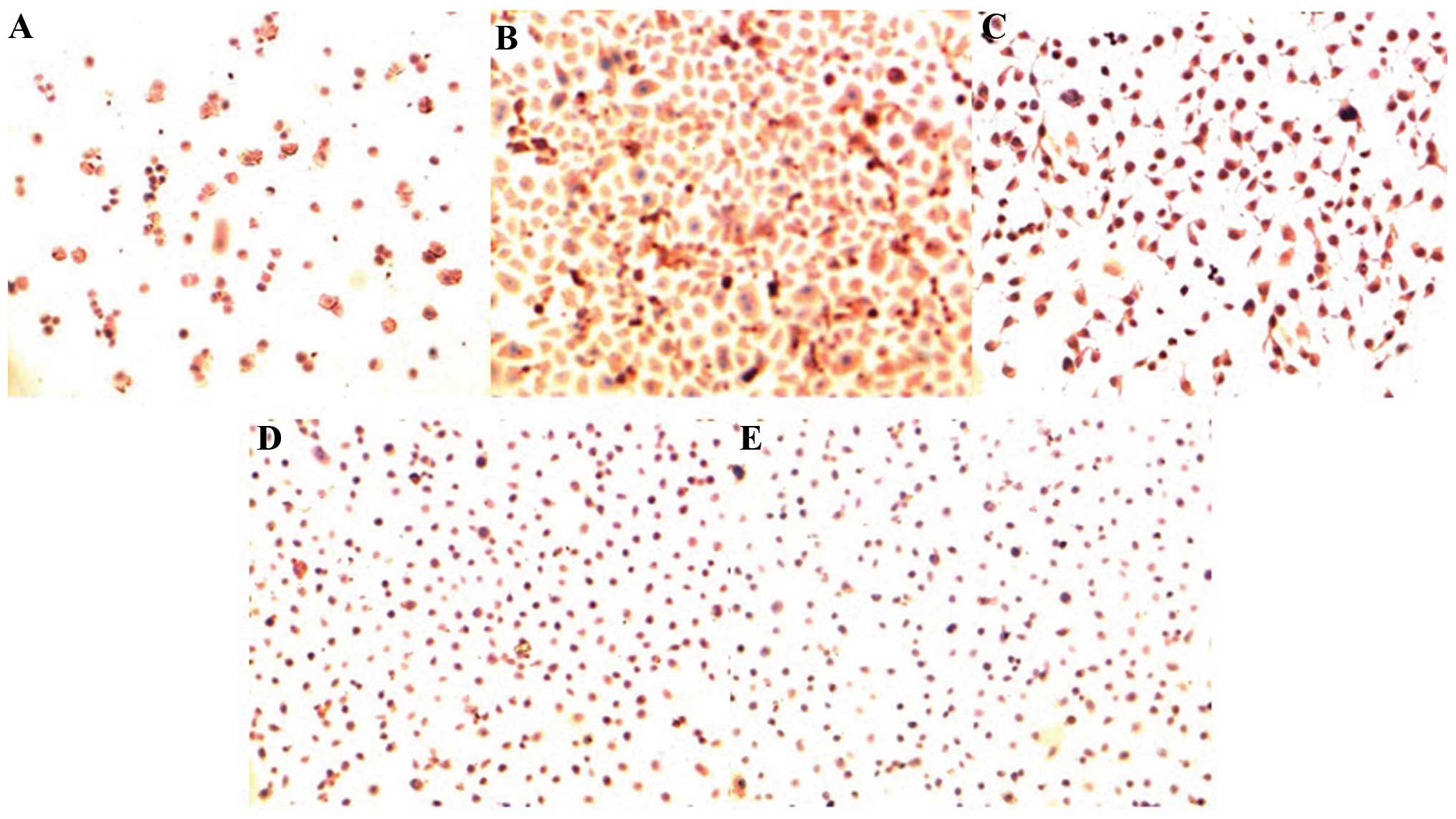|
1
|
Lo KW, To KF and Huang DP: Focus on
nasopharyngeal carcinoma. Cancer Cell. 5:423–428. 2004. View Article : Google Scholar : PubMed/NCBI
|
|
2
|
Siddique MA, Sabur MA, Kundu SC, et al:
Difficulty in diagnosis of nasopharyngeal carcinoma. Mymensingh Med
J. 21:158–161. 2012.PubMed/NCBI
|
|
3
|
Dong JT, Lamb PW, Rinker-Schaefer CW, et
al: KAI-1, a metastasis suppressor gene for prostate cancer on
human chromosome 11p11.2. Science. 268:884–886. 1995. View Article : Google Scholar : PubMed/NCBI
|
|
4
|
Takeda T, Hattori N, Tokuhara T, et al:
Adenoviral transduction of MRP-1/CD9 and KAI-1/CD82 inhibits lymph
node metastasis in orthotropic lung cancer model. Cancer Res.
67:1744–1749. 2007. View Article : Google Scholar : PubMed/NCBI
|
|
5
|
Teo PM, Leung SF, Yu P, Tsao SY, Foo W and
Shiu W: A comparison of Ho’s, International Union Against Cancer,
and American Joint Committee stage classifications for
nasopharyngeal carcinoma. Cancer. 67:434–439. 1991. View Article : Google Scholar : PubMed/NCBI
|
|
6
|
Brierly JD, Catton PA, O’Sullivan B, et
al: Accuracy of recorded tumor, node, and metastasis stage in a
comprehensive cancer center. J Clin Oncol. 20:413–419. 2002.
View Article : Google Scholar
|
|
7
|
Tsutsumi S, Shimura T, Morinaga N, et al:
Loss of KAI-1 expression in gastric cancer. Hepatogastroenterology.
52:281–284. 2005.PubMed/NCBI
|
|
8
|
Yang X, Wei LL, Tang C, Slack R, Mueller S
and Lippman ME: Overexpression of KAI1 suppresses in vitro
invasiveness and in vivo metastasis in breast cancer cells. Cancer
Res. 61:5284–5288. 2001.PubMed/NCBI
|
|
9
|
Huang CI, Kohno N, Ogawa E, Adachi M, Taki
T and Miyake M: Correlation of reduction in MRP-l/CD9 and KAIl/CD82
expression with recurrences in breast cancer patients. Am J Pathol.
153:973–983. 1998. View Article : Google Scholar : PubMed/NCBI
|
|
10
|
Takaoka A, Hinoda Y, Sato S, Itoh F,
Adachi M, Hareyama M and Imai K: Reduced invasive and metastatic
potentials of KAI-1 transfected melanoma cells. Jpn J Cancer Res.
89:397–404. 1998. View Article : Google Scholar : PubMed/NCBI
|
|
11
|
He B, Liu L, Cook GA, et al: Tetraspanin
CD82 attenuates cellular morphogenesis through down-regulating
integrin alpha6-mediated cell adhesion. J Biol Chem. 280:3346–3354.
2005. View Article : Google Scholar
|
|
12
|
Charrin S, Manie S, Oualid M, et al:
Differential stability of tetraspanin/tetraspanin interactions:
role of palmitoylation. FEBS Lett. 516:139–144. 2002. View Article : Google Scholar : PubMed/NCBI
|
|
13
|
Zhou B, Liu L, Reddivari M and Zhang XA:
The palmitoylation of metastasis suppressor KAI-1/CD 82 is
important for its motility-and invasiveness-inhibitory activity.
Cancer Res. 64:7455–7463. 2004. View Article : Google Scholar : PubMed/NCBI
|
|
14
|
Ito Y, Yoshida H, Uruno T, et al: KAI-1
expression in tlyroidneoplasmg: its linkage with clinic opathologic
features in papillary carcinoma. Pathol Res Pract. 199:79–83. 2003.
View Article : Google Scholar
|
|
15
|
Chen Z, Mustafa T, Trojanowicz B, et al:
CD82 and CD63 in thyroid cancer. Int J Mol Med. 14:517–527.
2004.PubMed/NCBI
|
|
16
|
Liu FS, Dong JT, Chen JT, et al: KAI1
metastasis suppressor protein is down-regulated during the
progression of human endometrial cancer. Clin Cancer Res.
9:1393–1398. 2003.PubMed/NCBI
|
|
17
|
Lijovic M, Somers G and Frauman AG:
KAIl/CD82 Protein expression in primary prostate cancer and in BPH
associated with cancer. Cancer Detect Prev. 26:69–77. 2002.
View Article : Google Scholar
|
|
18
|
Christgen M, Bruchhardt H, Ballmaier M, et
al: KAI-1/CD82 is a novel target of estrogen receptor-mediated gene
repression and down regulated in primary human breast cancer. Int J
Cancer. 123:2239–2246. 2008. View Article : Google Scholar : PubMed/NCBI
|
|
19
|
Christgen M, Christgen H, Heil C, et al:
Expression of KAI1/CD82 in distant metastases from estrogen
receptor-negative breast cancer, Inhibitory effect of KAI-1 gene on
breast cancer cell growth in vitro. Cancer Sci. 100:1767–1771.
2009. View Article : Google Scholar : PubMed/NCBI
|
|
20
|
Malik FA, Sanders AJ, Kayani MA and Jiang
WG: Effect of expressional alteration of KAI-1 on breast cancer
cell growth, adhesion, migration and invasion. Cancer Genomics
Proteomics. 6:205–213. 2009.PubMed/NCBI
|
|
21
|
Zhang BH, Liu W, Li L, et al: KAI1/CD82
and MRP1/CD9 serve as markers of infiltration, metastasis, and
prognosis in laryngeal squamous cell carcinomas. Asian Pac J Cancer
Prev. 14:3521–3526. 2013. View Article : Google Scholar : PubMed/NCBI
|
|
22
|
Ma ZB, Li K, Wang J and Guo GH: Role of
KAI1/CD82 polymorphisms in colon cancer risk in Han Chinese
population. Med Oncol. 30:668–672. 2013. View Article : Google Scholar : PubMed/NCBI
|
|
23
|
Knoener M, Krech T, Puls F, et al: Limited
value of KAI1/CD82 protein expression as a prognostic marker in
human gastric cancer. Dis Markers. 32:337–342. 2012. View Article : Google Scholar : PubMed/NCBI
|
|
24
|
Jiang WX, Song BG and Wang PJ: Expression
of nm23, KAI1 and spiral computed tomography findings in primary
gallbladder carcinoma. Chin Med J. 122:2666–2668. 2009.PubMed/NCBI
|
|
25
|
Guo C, Liu QG, Zhang L, Song T and Yang X:
Expression and clinical significance of p53, JunB and KAI1/CD82 in
human hepatocellular carcinoma. Hepatobiliary Pancreat Dis Int.
8:389–396. 2009.PubMed/NCBI
|
|
26
|
Yusenko MV and Kovacs G: Identifying CD82
(KAI1) as a marker for human chromophobe renal cell carcinoma.
Histopathology. 55:687–695. 2009. View Article : Google Scholar : PubMed/NCBI
|
|
27
|
You J, Madigan MC, Rowe A, et al: An
inverse relationship between KAI1 expression, invasive ability, and
MMP-2 expression and activity in bladder cancer cell lines. Urol
Oncol. 9:1324–1330. 2010.
|
|
28
|
Lee HA, Park I, Byun HJ, et al: Metastasis
suppressor KAI1/CD82 attenuates the matrix adhesion of human
prostate cancer cells by suppressing fibronectin expression and β1
integrin activation. Cell Physiol Biochem. 27:575–586. 2011.
View Article : Google Scholar
|

















